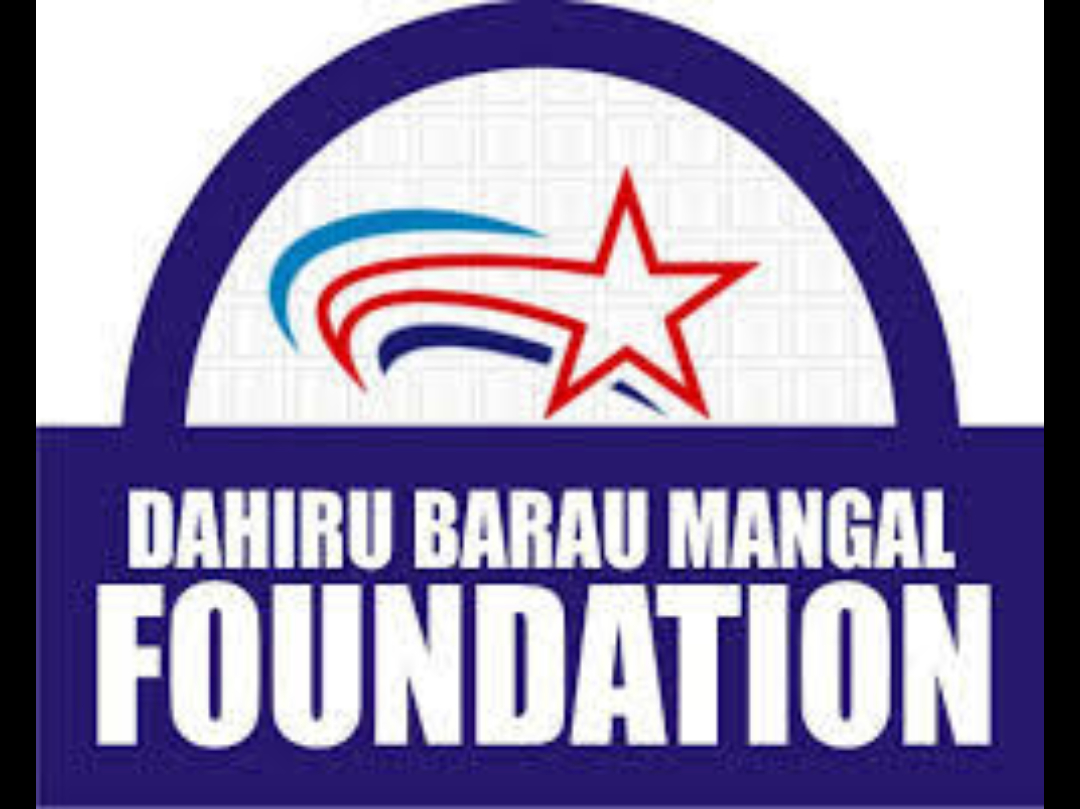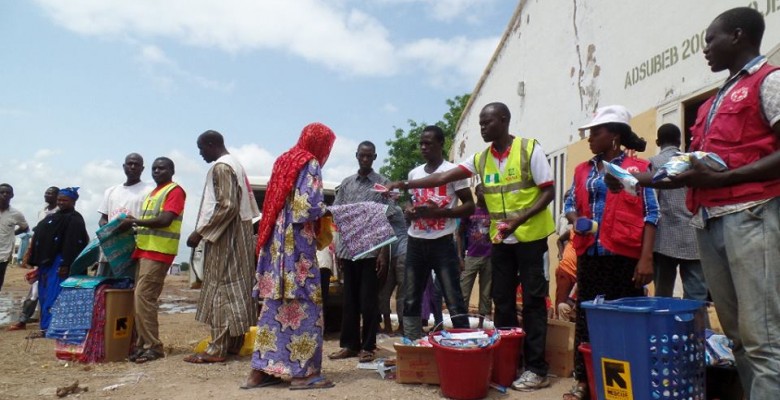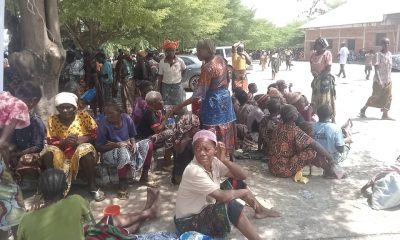Health
World Breastfeeding Week :UNICEF and WHO Tasks Government to Increase Resources for Breastfeeding Programmes.

By Evelyn Terseer, Abuja
As global crises continue to threaten the health and nutrition of millions of babies and children, the vital importance of breastfeeding as the best possible start in life is more critical than ever.
“This World Breastfeeding Week, under its theme Step up for breastfeeding: Educate and Support, UNICEF and WHO are calling on governments to allocate increased resources to protect, promote, and support breastfeeding policies and programmes, especially for the most vulnerable families living in emergency settings.
“During emergencies, including those in Afghanistan, Yemen, Ukraine, the Horn of Africa, and the Sahel, breastfeeding guarantees a safe, nutritious and accessible food source for babies and young children.
It offers a powerful line of defense against disease and all forms of child malnutrition, including wasting.According to UNICEF and WHO, in Nigeria, the Exclusive Breastfeeding rate is 29%, meaning that over 70% of infants in Nigeria are denied the aforementioned benefits of breast milk in their formative years. Only 9% of organizations have a workplace breastfeeding policy, indicating that mothers lack the enabling environment to optimally breastfeed their babies. The results are high stunting rates of 37% of children Under-5, of which 21% are severe, and wasting among children under 5 years of age (7%). They continue to present severe consequences for the child.
“Breastfeeding also acts as a baby’s first vaccine, protecting them from common childhood illnesses”.
“Yet the emotional distress, physical exhaustion, lack of space and privacy, and poor sanitation experienced by mothers in emergency settings mean that many babies are missing out on the benefits of breastfeeding to help them survive.
In a joint statement by UNICEF Executive Director Catherine Russell and WHO Director General Dr. Tedros Adhanom Ghebreyesu, they said fewer than half of all newborn babies are breastfed in the first hour of life, leaving them more vulnerable to disease and death. And only 44 per cent of infants are exclusively breastfed in the first six months of life, short of the World Health Assembly target of 50 per cent by 2025.
“Protecting, promoting, and supporting breastfeeding is more important than ever, not just for protecting our planet as the ultimate natural, sustainable, first food system, but also for the survival, growth, and development of millions of infants.
“That is why UNICEF and WHO are calling on governments, donors, civil society, and the private sector to step up efforts to prioritize investing in breastfeeding support policies and programmes, especially in fragile and food insecure contexts, equip health and nutrition workers in facilities and communities with the skills they need to provide quality counselling and practical support to mothers to successfully breastfeed, protect caregivers and health care workers from the unethical marketing influence of the formula industry by fully adopting and implementing the International Code of Marketing of Breast Milk Substitutes, including in humanitarian settings implement family-friendly policies that provide mothers with the time, space, and support the need to breastfeed.”
Health
NAFDAC Intensifies Regulatory, Sensitization Activities in Yobe

The National Agency for Food and Drug Administration and Control (NAFDAC) says it intensified regulatory and public sensitization activities across Yobe in the first half of 2025.
Mr. Lawan Dadingelma, Yobe Coordinator of NAFDAC, made this known in an interview on Wednesday in Damaturu.
Dadingelma said the agency embarked on various campaigns and enforcement actions to ensure public safety and compliance with regulatory standards.
He said that the office carried out sensitisation exercises at the fruit and vegetable markets in Damaturu and Gashua, warning against the use of calcium carbide for ripening fruits and vegetables.
He said that the public was also sensitised on the dangers of using harmful chemicals to preserve agricultural produce such as beans, groundnuts, millet, and other food items.
Dadingelma said that the agency equally held meetings with associations of water and bakery producers to promote adherence to safety standards.
He added that the agency conducted awareness sessions on good warehousing practices for drinks and soft drinks.
“NAFDAC intensified regulatory monitoring activities in Damaturu, Potiskum, Gashua, and Geidam Local Government Areas, focusing on water production and bakeries.
“We also held an engagement with herbal product manufacturers in the state and sensitised local rice millers in Potiskum on best practices.
“Sanctions were imposed on patent medicine vendors found violating regulations, while drug hawkers across the state were similarly penalised.
“The agency also engaged NGOs, including the Society for Family Health, to enhance collaborative public health advocacy,” he said.
Dadingelma pointed out that the efforts were part of their mandate to safeguard public health and ensure that all regulated products met required safety standards. (NAN)
Health
Flooding: Monarch Introduces Weekly Environmental Sanitation

The Paramount Ruler of all Awori-speaking people, Oba Sulaiman Adekunle Bamigbade, Ayodele III, has directed residents of estates and communities within his domain to commence weekly environmental sanitation to mitigate the risk of flooding.
In a letter dated June 11, 2025, addressed to leaders and residents of various estates and communities under his jurisdiction, Oba Bamigbade stated that the decision was in response to predictions of heavy rainfall and potential flooding in the coming months.
According to the letter, which was made available to newsmen and signed by the monarch himself, the move aligns with recent warnings by the Nigerian Meteorological Agency (NiMET), which forecasted flooding in several states across the country due to expected intense rainfall.
“In light of the recent flooding predictions issued by the Nigerian Meteorological Agency (NiMET), it has become imperative for communities within our domain to take proactive steps towards safeguarding our environment and the wellbeing of our residents,” the monarch stated.
“To this end, I am calling for a mandatory weekly sanitation exercise across all estates within the Isheri Estates Community,” he added.
During the weekly exercise, residents are expected to clear drains, de-silt gutters, and properly dispose of domestic waste, among other activities to ensure a clean and flood-free environment.
Oba Bamigbade emphasized that there would be strict monitoring to ensure compliance, noting that he would personally visit estates and communities to assess adherence.
He further stated that the palace and its surrounding areas would take the lead in the exercise and that information regarding the sanitation directive would be disseminated to the grassroots to ensure widespread awareness.
The monarch’s initiative is part of a broader community effort to promote environmental responsibility and prevent avoidable disasters during the rainy season.
| ReplyReply allForwardAdd reaction |
Health
Foundation Sponsors Urology Surgery for 3,000 Vulnerable Patients in Katsina

No fewer than 3,000 vulnerable patients have benefited from the Alhaji Dahiru Mangal Foundation’s urology surgery intervention in Katsina State.
Alhaji Mangal, a philanthropist, has spent about N80 million since inception of the sponsored surgery project in the state.
Husaaini Kabir, a Board of Trustees (BOT) member of Mangal Foundation disclosed this during the launch of the exercise in Katsina on Saturday.
He explained that urology was part of healthcare that deals with diseases of the urinary tract (kidneys, ureters, bladder and urethra).
Kabir said that since the commencement of the exercise, no fewer than 3,000 vulnerable patients have benefited in about 10 exercises conducted previously in the state.
According to him, about N20 million has been earmarked to sponsor no fewer than 100 patients during the second quarter of the year.
He noted that drugs would be provided free for those whose condition did not require surgery after being checked.
Kabir disclosed that the exercise was part of the foundation’s Corporate Social Responsibility (CSR), aimed at giving back to the society, especially to the less privileged.
The BOT member added that people from different villages within the state, neighbouring states and also from Niger Republic, were equally benefiting from the gesture.
He said that the objective was to alleviate the burden of healthcare costs on the most vulnerable people, as many of them struggled to meet basic needs.
Kabir said the foundation had engaged the best medical team, adding that patients could also be screened at the Amadi Rimi Orthopaedic Hospital, in Batagarawa Local Government Area of the state.
He said: “The foundation has engaged the best medical team and procured high quality drugs and medical equipment for the surgery.
“The foundation is exclusively for empowerment, development, educational, charitable purposes and for supporting the poor and vulnerable in the area of healthcare and economic skill.”
He revealed that the foundation, which was established in 2016, had sponsored eye, hernia, and hydrocele surgical operations for thousands of vulnerable patients.
Responding, a beneficiary and staff of Katsina State Polytechnic, Malam Adamu Aliyu, commended the sponsor, saying that he was happy to be one of the beneficiaries.
He said that it was quite a relief as his meagre salary could not afford him the surgery.
Aliyu and other beneficiaries called on government, private organisations, and other wealthy individuals to emulate the gesture extended by the foundation.





























